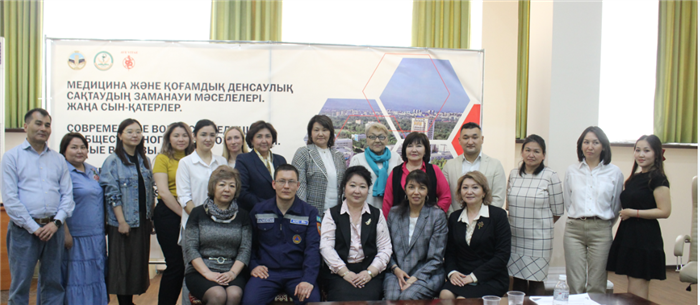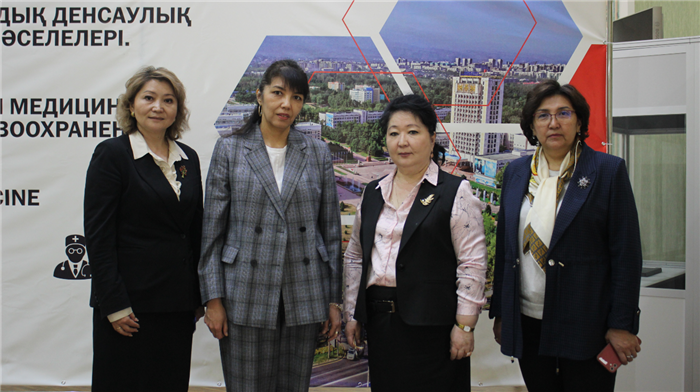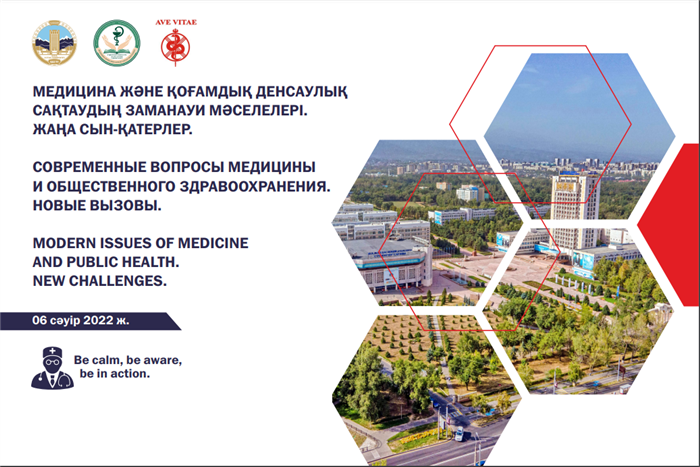RESOLUTION OF THE INTERNATIONAL SCIENTIFIC AND PRACTICAL CONFERENCE “MODERN ISSUES OF MEDICINE AND PUBLIC HEALTH. NEW CHALLENGES”

RESOLUTION
OF THE INTERNATIONAL SCIENTIFIC AND PRACTICAL CONFERENCE “MODERN ISSUES OF MEDICINE AND PUBLIC HEALTH. NEW CHALLENGES”
The conference participants note that emergencies can have devastating and long-term consequences not only for human health but also for societies and economies. Therefore, this aspect is a new challenge for healthcare systems in the modern world, so the conference participants consider it necessary:
Update and implementation of the 3rd public health operational function (WHO recommendations):
- Preparedness and planning for public health emergencies.
- Development of a common and comprehensively justified, accessible to all and pragmatic plan, which defines the responsibilities of organizations, communication algorithms and information networks.
- Definition and description of possible and typical regional catastrophes and public health emergencies.
- Development of specific guidelines for preparedness for emergency response in the relevant area (i.e., natural disasters, infectious disease outbreaks, chemical threats, radiation threats and bioterrorism).
- Development of a system for predicting various factors that can cause an emergency of various types.
- Identification of populations at risk and their needs.
- Carry out a systematic assessment of available forces and means to take action.
- Existence of information systems, including national and international alert networks.
- Development of a plan that defines the responsibilities of organizations, provides for communication and information networks, and clearly defines alert and evacuation protocols.
- Evaluate the effectiveness of past incidents and identify opportunities for improvement.
- Maintain a list of personnel with the technical expertise and knowledge necessary to respond to all natural and man-made emergencies.
- Coordination of a network of experts and specialists in various types of public health emergencies.
- Implementation of the International Health Regulations (IHR) in contingency planning.
- An integrated approach to planning actions for all possible emergencies.
For the implementation of tasks:
- Recommend to the Ministry of Education and Science of the Republic of Kazakhstan to initiate the development of educational programs for postgraduate advanced training on issues of action in emergencies.
- Recommend to the Ministry of Healthcare of the Republic of Kazakhstan to include in the educational programs of graduates in the direction of "Healthcare", an examination in the form of a test of knowledge of triage, evacuation, and emergency assistance.
- Recommend to the Ministry of Emergency Situations and the Ministry of Health of the Republic of Kazakhstan, with the involvement of international organizations, the development of standard operating procedures for a joint program of interdepartmental response in case of emergencies with the provision of integrated medical and psychological assistance to victims, including medical workers.
- Recommend to the Ministry of Culture and Sport of the Republic of Kazakhstan to develop animated films, and TV shows using modern information technologies and forms for children to provide first aid.
- To involve representatives of non-governmental organizations in solving problems aimed at improving the service of disaster medicine, to recommend to local executive bodies, the Ministry of Healthcare of the Republic of Kazakhstan, the Ministry of Internal Affairs of the Republic of Kazakhstan to provide funds in the budget for the state order for socially significant projects aimed at prevention and prevention of negative consequences in emergencies.
- Consolidation of all-volunteer organizations and coordination of their activities with the creation of a Register of their data and information, followed by the organization of the process of accreditation of volunteer organizations and recognition of their status.
- Amend the current legislation to improve the status of medical workers during emergencies, with the assignment of the status of RESCUE and with appropriate benefits.
- Recommend to the Health Departments and heads of medical organizations to conduct an examination of healthcare facilities for readiness to respond to an emergency and work offline for at least 3 days after a large-scale disaster.
- Recommend to local executive bodies to develop a plan for conducting interdepartmental exercises and training with the involvement of medical organizations, regardless of ownership.
- Recommend the emergency service to develop tactical tasks for the Ministry of Education of the Republic of Kazakhstan, action algorithms for training in schools, and colleges on emergency response issues.
- Join forces with The German-Kazakh Network for Biosafety and Biosecurity to solve problems related to emergency response.
- Together with the Akimat of Almaty, open a Coordination Center for Emergency Response on the basis of Al-Farabi KazNU.
- Contact the Ministry of Emergency Situations, the Ministry of Healthcare of the Republic of Kazakhstan, the Akimat of Almaty, the NGO “National Medical Association” with the initiative to hold in September 2022, a conference with field exercises on emergencies on the territory of NJSC “al-Farabi KazNU” with the involvement of student youth and professorial teaching staff.
The conference participants expressed their gratitude for the assistance in organizing and holding the International Scientific and Practical Conference “MODERN ISSUES OF MEDICINE AND PUBLIC HEALTH. NEW CHALLENGES” to the WHO Representative Office in the Republic of Kazakhstan, to the Republican Public Association “National Medical Association”, to representatives of state bodies of the Republic of Kazakhstan, to the German-Kazakh Network for Biosafety and Biosecurity, to the Republican Special Purpose Rescue Center of the Ministry of Emergency Situations of Uzbekistan, to medical organizations in Almaty, representatives of universities of CIS countries.










